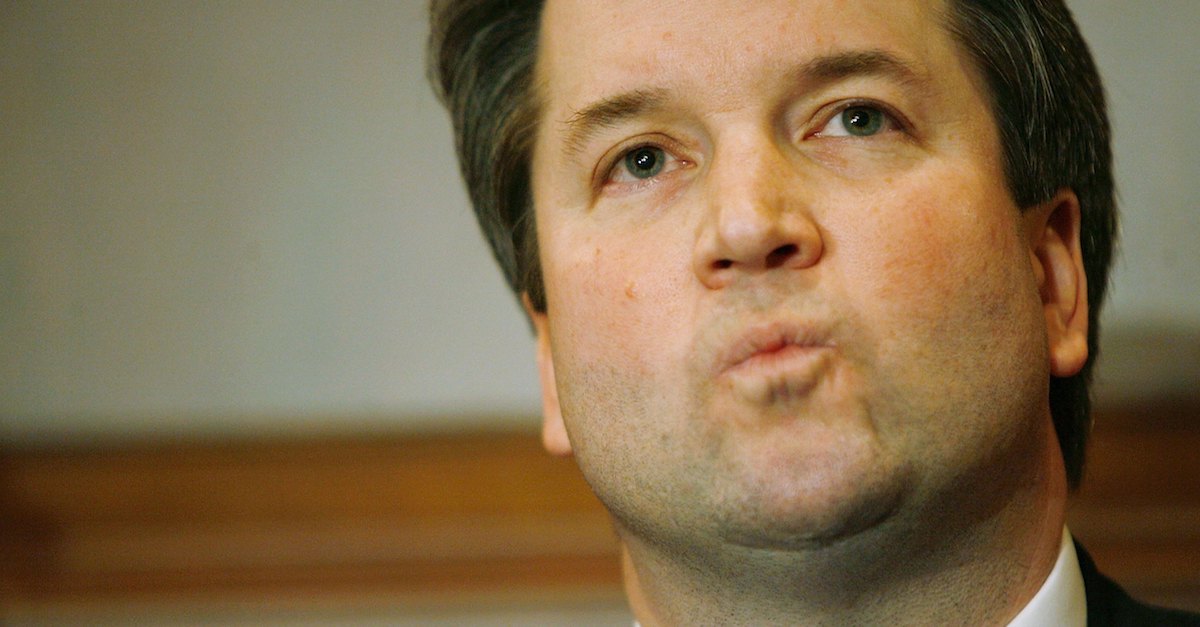
One of the Russian companies indicted by special counsel Robert Mueller for its alleged involvement in a troll farm scheme has littered a recent motion to dismiss with a number of citations to President Donald Trump‘s Supreme Court nominee, U.S. Appellate Judge Brett Kavanaugh.
On Monday, attorneys for Concord Management and Consulting LLC filed a 295-page motion to dismiss and proposed dismissal order (along with numerous pages of supporting documentation) with the U.S. District Court for the District of Columbia–the court on which Judge Kavanaugh currently sits.
In a lengthy memo accompanying the motion and proposed order, Judge Kavanaugh is referenced nine times in total.
The first Kavanaugh reference comes by way of the case stylized as Bluman v. Fed. Election Comm’n. This case ultimately narrowed the scope of the ban on foreign nationals to exclude “issue advocacy.” Kavanaugh wrote [emphasis in original]:
“[W]e caution the government that seeking criminal penalties for violations of [laws regulating foreign nationals’ political contributions or expenditures] will require proof of defendant’s knowledge of the law…There are many aliens in this country who no doubt are unaware of the statutory ban on foreign expenditures…
As Campaign Legal Center’s Brendan Fischer noted, Kavanaugh’s opinion did some very heavy lifting to narrow said scope:
in Bluman, Kavanaugh went out of his way to narrow the foreign national ban to apply only to “spending money in order to expressly advocate for or against the election of a candidate.”
That excludes much of Russia’s spending–and Russia’s lawyers picked up on it: pic.twitter.com/wsck3fGYcI
— Brendan Fischer (@brendan_fischer) July 17, 2018
The second and third Kavanaugh references come by way of Concord Management’s argument that the special counsel lacks any statutory authority to charge the company with conspiracy. Before citing to the above language from Kavanaugh, the motion to dismiss notes:
There is, however, no basis to charge anyone, including a foreign national, as a co-conspirator without a wrongful intent to engage in unlawful conduct specified in some statutory or regulatory scheme. Yet that is exactly what the Special Counsel is attempting here, evoking Judge Kavanaugh’s admonition, in speaking for this Court in Bluman…
The fourth Kavanaugh reference again cites to the judge’s decision in the Bluman case. This time, however, Concord Management discusses the Department of Justice’s “Guidelines for Federal Prosecution of Election Offenses.” According to their argument, these guidelines “require proof” that defendants charged under the federal conspiracy to defraud statute acted with “the awareness of unlawfulness.” The motion notes, before quoting the first-referenced Kavanaugh language once again:
The Guidelines are, moreover, consistent with Judge Kavanaugh’s opinions in Bluman and Moore…”[W]e caution the government that seeking criminal penalties for violations of [laws regulating foreign nationals’ political contributions or expenditures] will require proof of defendant’s knowledge of the law.”
The fifth Kavanaugh reference is also made in service of the federal guidelines argument. In this instance, the motion cites Kavanaugh’s opinion in the case stylized as United States v. Moore. This case concerned a man who “knowingly and willfully” signed a false name on a Postal Service delivery form.
Judge Kavanaugh’s concurrence is a lengthy discussion on the potential for “abuse and injustice” to arise from prosecutorial use of 18 U.S.C. § 1001. Concord Management cites to the following language in said concurrence:
[T]he Supreme Court’s precedents arguably require district courts in § 1001 cases to give a willfulness instruction that requires proof that the defendant knew his conduct was a crime.
The sixth Kavanaugh reference cites the exact language taken from Moore above, with a slight addition. The citation reads, “the Supreme Court’s precedents arguably require district courts in [18 U.S.C.] § 1001 cases to give a willfulness instruction that requires proof that the defendant knew his conduct was a crime.”
The seventh, eighth and ninth Kavanaugh references are dropped into footnote 13 on page 31 of the accompanying memo. This footnote briefly discusses Kavanaugh’s suggestion that a prior ruling may need to be reconsidered in light of later precedent. The ruling in question concerns the case stylized as United States v. Hsia. The motion notes the outcome of this case:
[T]he D.C. Circuit reversed the dismissal of the five substantive counts for making false statements in violation of 18 U.S.C. §§ 2 and 1001, concluding that under those provisions, “the government need not prove that Hsia knew her acts to be unlawful.” Rather, the court found, the government need only show that the defendant knew that the statements were false and the defendant intentionally caused the statements to be made by another.
This would seemingly be a reference that doesn’t quite bode well for Concord Management. But the footnote posits that, once again, it’s Judge Kavanaugh to the rescue of the alleged Russian trolls. The footnote reads, in full:
Even this finding, beside the point in this § 371 case, is on shaky ground, as Judge Kavanaugh pointed out in Moore, 612 F.3d at 704 (Kavanaugh, J., concurring) (noting that “Hsia referenced a 1994 Third Circuit opinion [Curran] that predated the Supreme Court’s clarifying decisions in Bryan and later cases,” and that, as a result, Hsia’s mens rea ruling may need to be reconsidered). Judge Kavanaugh went on to say that “in a case where the issue is raised, the Supreme Court’s precedents arguably require district courts in § 1001 cases to give a willfulness instruction that requires proof that the defendant knew his conduct was a crime.”
In other words, Concord Management’s final invocation of Kavanaugh is a reference to the judge’s opinion that the bar for violating the materially false statements statute is now exceedingly high. It’s easy enough to see why Judge Kavanaugh’s words here offer the defendants more than a little bit of comfort.
[image via Chip Somodevilla/Getty Images]